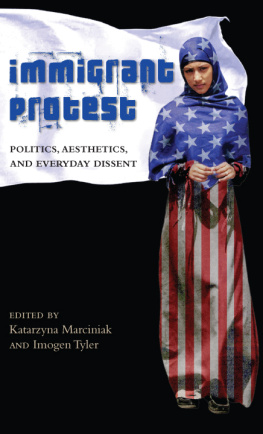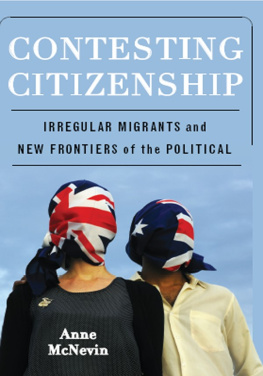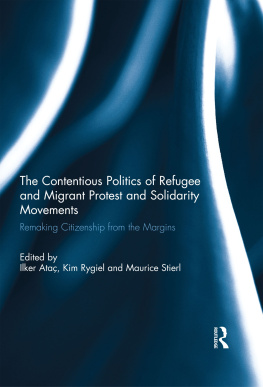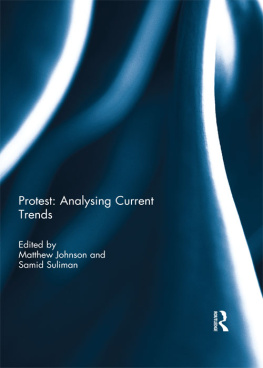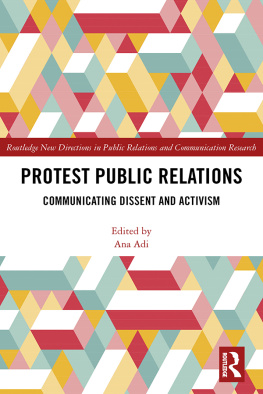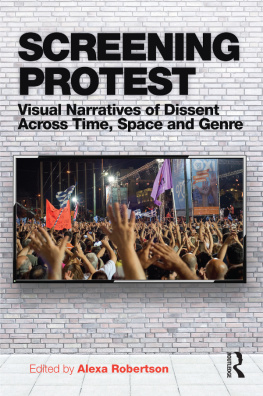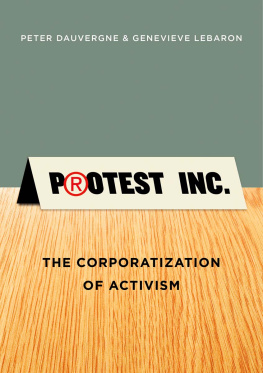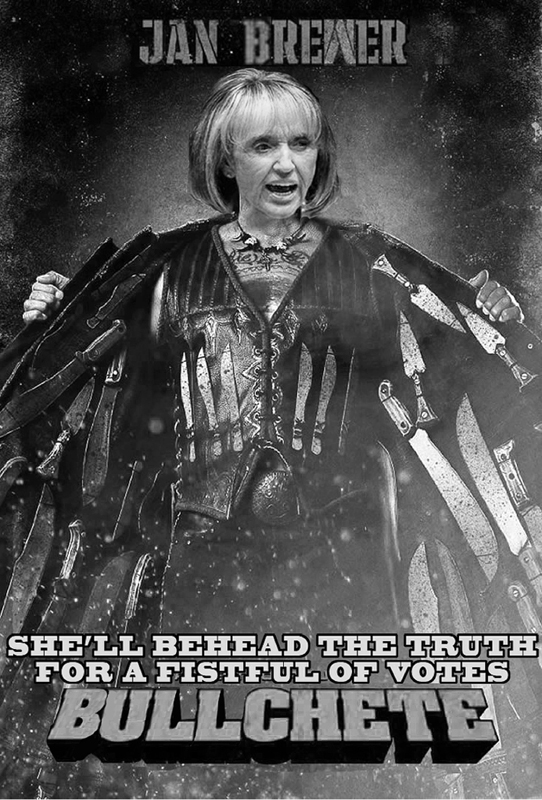Immigrant Protest
SUNY SERIES , P RAXIS : T HEORY IN A CTION
Nancy A. Naples, editor
Immigrant Protest
P OLITICS , A ESTHETICS , AND E VERYDAY D ISSENT
Edited by
KATARZYNA MARCINIAK
and
IMOGEN TYLER
Published by
STATE UNIVERSITY OF NEW YORK PRESS
Albany
2014 State University of New York
All rights reserved
Printed in the United States of America
No part of this book may be used or reproduced in any manner whatsoever without written permission. No part of this book may be stored in a retrieval system or transmitted in any form or by any means including electronic, electrostatic, magnetic tape, mechanical, photocopying, recording, or otherwise without the prior permission in writing of the publisher.
For information, contact
State University of New York Press
www.sunypress.edu
Production, Laurie D. Searl
Marketing, Anne M. Valentine
Library of Congress Cataloging-in-Publication Data
Immigrant protest : politics, aesthetics, and everyday dissent / edited by Katarzyna Marciniak and Imogen Tyler.
p. cm. (SUNY series, Praxis : theory in action)
Includes bibliographical references and index.
ISBN 978-1-4384-5311-8 (hardcover : alk. paper)
ISBN 978-1-4384-5312-5 (ebook)
1. ImmigrantsPolitical activity. 2. Illegal aliensPolitical activity. 3. Protest movements. 4. ImmigrantsPolitical activityCase studies. 5. Illegal aliensPolitical activityCase studies. 6. Protest movementsCase studies. I. Marciniak, Katarzyna, 1963 , author, editor of compilation. II. Tyler, Imogen, author, editor of compilation.
| JV6255.I56 2014 |
| 322.4086'912dc23 | 2013044072 |
10 9 8 7 6 5 4 3 2 1
Contents
Katarzyna Marciniak and Imogen Tyler
Azra Akamija
Rozalinda Borcil with Katarzyna Marciniak and Imogen Tyler
Lena imi with Imogen Tyler
Alex Rivera with Katarzyna Marciniak
Bruce Bennett
Katarzyna Marciniak
Simon Faulkner
Teresa Piacentini
Maja Sager
Petra Rostock
Alexandra Zavos
Marguerite Waller
Anti-Raids Campaign Coalition
Imogen Tyler and Katarzyna Marciniak
Illustrations
Acknowledgments
This edited collection on immigrant protest has been a labor of love involving various intensive cross-border collaborations, negotiations, and translations. Our aim in bringing together this eclectic mixture of academic, activist, and artistic work was to highlight the question of the politics of migrant representation. In particular, we wanted to explore how xenophobic politics, which pivot on the problem of migration, is being troubled and contested through creative projects and everyday practices of resistance around the world. We owe a debt of thanks to the contributors to this book for going on this journey with us and for sharing intellectual passions and a belief in the power of oppositional, antiracist practices to effect social change.
Our special gratitude goes to the artists who generously permitted us to reproduce their images: Bullchete by Alex Rivera, Welcome to Gringolandia by Xico Gonzalez, Whos the Illegal Alien Pilgrim? by Yolanda Lopez, and Admit None by the THINK AGAIN Collective. The images by Gonzales, Lopez, and THINK AGAIN came from the collection of the Center for the Study of Political Graphics in Los Angeles and we thank the director of CSPG, Carol Wells, for facilitating permissions. The book cover, Survival Mosque , shared with us by one of our contributors, Azra Akamija, speaks to the politically playful spirit of our collection.
We thank the Migrancy Research Group, the Sociology Department, and the Centre for Gender and Womens Studies at Lancaster University in UK for inviting Katarzyna in 2010 to participate in the workshop on Immigrant Protest, an event that precipitated our collaboration.
At SUNY, we thank Beth Bouloukos and Rafael Chaiken for their invaluable assistance. Special appreciation goes to Nancy Naples who, as a series editor of Praxis: Theory in Action at SUNY, accepted our project as part of the series. We are also grateful to anonymous reviewers for helpful insights.
Ohio University has been very supportive in helping us bring this project to publication. For the subvention assistance, Katarzyna thanks Dean Robert Frank at the College of Arts and Sciences and Dr. Joseph Shields, the Vice President for Research. For the financial help with image permissions, thanks go to Senior Associate Dean Howard Dewald at the College of Arts and Sciences.
Immigrant Protest
Bullchete , 2011. Courtesy of Alex Rivera
I NTRODUCTION
Immigrant Protest
Noborder Scholarship
K ATARZYNA M ARCINIAK AND I MOGEN T YLER
In April 2010, Arizona governor Jan Brewer signed into law what was touted as the nations toughest bill yet on illegal immigration, Support Our Law Enforcement and Safe Neighborhoods Act (commonly known as Arizona SB 1070). This controversial legislation made multiple ostracizing stipulations, including requiring immigrants to carry their documents at all timeswhich makes Latina/os especially (documented or not) vulnerable to surveillance and identity checks.
Shortly afterward, on Cinco de Mayo, a holiday that celebrates Mexican heritage, Chicano filmmaker Robert Rodriguez released an online trailer for the now cult Mexploitation action film Machete (2010): a cinematic announcement that might be read as a direct response to the punitive Arizona legislature. The trailer is introduced by the films title character Machete, played by frequent Rodriguez collaborator Danny Trejo. An intimidating figure, his body scarred and tattooed, he looks sternly at the camera and speaks angrily: This is Machete with a special Cinco de Mayo message to ARIZONA! In the fast-paced scenes that follow, we see Machete performing over-the-top revenge on those who wronged him and we hear a voiceover: They soon realized they just fucked with the wrong Mexican!
Machete rampages through the film like a Mexican Terminator, equipped with multiple steel knives attached to his body. Alongside him, armies of Mexicans with machetes and guns march out to kill white people. Highlighting what Bruce Bennett in this volume terms an eye-jabbing aesthetic, Machete is a thoroughly violent spectacle in which the protagonist insists on using his machete, ensuring that each killing is tactile. Slashed bellies, dripping blood, cut-off hands, gouged eyes, dangling intestinesthe relentless stabbings, dismemberments, and beheadingsare visual tropes that dramatize immigrant rage.
These revenge killings are mirrored throughout the film by multiple scenes of anti-immigrant violence. In one of the early moments in the narrative, Von Jackson (Don Johnson), a vigilante leading the Border Patrol, nonchalantly shoots a pregnant Mexican woman at the border, saying, You know, you trespassing, on my daddys land. This brutality parallels the speeches by Senator John McLaughlin (Robert de Niro), a politician campaigning against undocumented crossers: Make no mistake, we are at war. Every time an illegal dances across our border, it is an act of aggression against the sovereign state, an overt act of terrorism.

